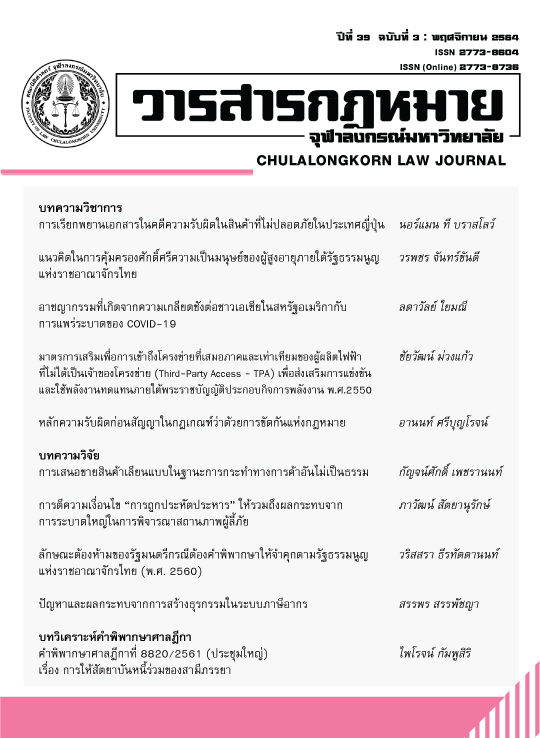การตีความเงื่อนไข “การถูกประหัตประหาร” ให้รวมถึง ผลกระทบจากการระบาดใหญ่ในการพิจารณาสถานภาพผู้ลี้ภัย
Main Article Content
บทคัดย่อ
การระบาดใหญ่ของโรค COVID-19 ที่มีความรุนแรงอย่างต่อเนื่องและมีรายงานผู้ติดเชื้อและผู้เสียชีวิตจำนวนมาก เป็นปรากฏการณ์ที่ส่งผลกระทบในเชิงลบและเพิ่มความเสี่ยงต่อการธำรงไว้ซึ่งมาตรฐานการครองชีพที่เพียงพออันเป็นสิทธิมนุษยชนขั้นพื้นฐานของบุคคล และทำให้บุคคลบางกลุ่มจำเป็นต้องย้ายถิ่นจากรัฐต้นทางเพื่อแสวงหาที่ลี้ภัยในรัฐอื่นที่น่าจะให้ความคุ้มครองในเรื่องนี้ได้มีประสิทธิภาพมากกว่าเนื่องจากไม่อาจขอรับความคุ้มครองจากรัฐต้นทางให้พ้นจากผลกระทบในเรื่องนี้ได้ อย่างไรก็ดี เงื่อนไขหนึ่งในการพิจารณารับรองสถานภาพผู้ลี้ภัยคือการพิจารณาว่าบุคคลที่ยื่นเรื่องนั้นได้รับผลกระทบจากการระบาดใหญ่ในลักษณะที่เข้าข่าย “ถูกประหัตประหาร” ในรัฐต้นทางหรือไม่ ซึ่งที่ผ่านมาพบว่าเงื่อนไขนี้มักได้รับการตีความให้หมายถึงการเลือกปฏิบัติที่ละเมิดสิทธิทางพลเรือนของบุคคล จนอาจทำให้ผลกระทบจากการระบาดใหญ่ไม่เข้าข่ายเงื่อนไขนี้ ดังนั้น บทความวิจัยฉบับนี้จึงมุ่งวิเคราะห์การตีความเงื่อนไขดังกล่าวโดยคำนึงถึงหลักการทั่วไปในการตีความสนธิสัญญาว่าน่าจะสามารถตีความให้รวมถึงผลกระทบจากการระบาดใหญ่ได้ โดยคำนึงถึงข้อท้าทายในทางปฏิบัติด้วย
Article Details
ลิขสิทธิ์และเนื้อหาในเว็บไซต์ของวารสารกฎหมาย (รวมถึง โดยไม่จำกัดเฉพาะ เนื้อหา รหัสคอมพิวเตอร์ งานศิลป์ ภาพถ่าย รูปภาพ ดนตรีกรรม โสตทัศนวัสดุ) เป็นกรรมสิทธิ์ของวารสารกฎหมาย และผู้ได้รับการโอนสิทธิทุกราย
1. วารสารกฎหมาย ให้อนุญาตให้คุณใช้สิทธิอันไม่เฉพาะเจาะจงที่สามารถถูกถอนเมื่อใดก็ได้ โดยไม่มีค่าใช้จ่าย ในการ
- เยี่ยมชมเว็บไซต์และเอกสารในเว็บไซต์นี้ จากคอมพิวเตอร์หรือเครื่องมือสื่อสารผ่านเว็บบราวเซอร์
- คัดลอกและจัดเก็บเว็บไซต์และเอกสารในเว็บไซต์นี้บนลงคอมพิวเตอร์ของคุณผ่านระบบความจำ cache
- สั่งพิมพ์เอกสารจากเว็บไซต์นี้สำหรับการใช้ส่วนตัวของคุณ
- ผลงานที่ได้รับการตีพิมพ์โดยวารสารกฎหมาย จุฬาลงกรณ์มหาวิทยาลัย ถูกคุ้มครองภายใต้ Creative Commons Attribution 4.0 International License ซึ่งอนุญาตให้ทุกคนสามารถคัดลอก แจกจ่าย ดัดแปลง ส่งต่อ ผลงานได้ ก็ต่อเมื่อผลงานและแหล่งข้อมูลได้รับการอ้างอิงอย่างเหมาะสม
2. วารสารกฎหมาย จุฬาลงกรณ์มหาวิทยาลัย สงวนสิทธิ์ไม่อนุญาตให้คุณใช้สิทธิอื่นใดที่เกี่ยวข้องกับเว็บไซต์และเอกสารบนเว็บไซต์นี้ เช่น การคัดลอก ดัดแปลง เปลี่ยนแปลง ส่งต่อ ตีพิมพ์ แจกจ่าย เผยแพร่ จัดแสดงในที่สาธารณะ ไม่ว่าจะในรูปแบบใดก็ตาม ซึ่งเว็บไซต์หรือเอกสารบนเว็บไซต์ โดยไม่อ้างอิงถึงแหล่งข้อมูลหรือโดยไม่ได้รับอนุญาตเป็นลายลักษณ์อักษรจากวารสารกฎหมาย จุฬาลงกรณ์มหาวิทยาลัย
3. คุณอาจขออนุญาตที่จะใช้เอกสารอันมีลิขสิทธิ์บนเว็บไซต์นี้โดยการเขียนอีเมลล์มายัง journal@law.chula.ac.th
4. วารสารกฎหมาย จุฬาลงกรณ์มหาวิทยาลัย เข้มงวดกับการคุ้มครองลิขสิทธิ์อย่างมาก หากวารสารกฎหมาย จุฬาลงกรณ์มหาวิทยาลัยพบว่าคุณได้ใช้เอกสารอันมีลิขสิทธิ์บนเว็บไซต์นี้โดยไม่ถูกต้องตามการอนุญาตให้ใช้สิทธิ ดังที่กล่าวไปข้างต้น วารสารกฎหมาย จุฬาลงกรณ์มหาวิทยาลัยอาจดำเนินคดีตามกฎหมายต่อคุณได้ เพื่อเรียกร้องค่าเสียหายที่เป็นตัวเงินและคำขอชั่วคราวให้คุณหยุดการใช้เอกสารดังกล่าว ทั้งนี้ คุณอาจถูกสั่งให้ชดใช้ค่าใช้จ่ายใดๆ ที่เกี่ยวข้องกับการดำเนินการตามกฎหมายนี้
หากคุณพบเห็นการใช้เอกสารอันมีลิขสิทธิ์ของวารสารกฎหมาย จุฬาลงกรณ์มหาวิทยาลัย ที่ขัดหรืออาจขัดต่อการอนุญาตให้ใช้สิทธิดังที่ได้กล่าวไปข้างต้น โดยเชื่อว่าได้ละเมิดลิขสิทธิ์ของคุณหรือของผู้อื่น สามารถร้องเรียนมาได้ที่ journal@law.chula.ac.th


